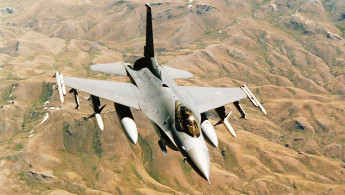IS may seek prisoner swap for captured pilot
In an interview with al-Araby al-Jadeed Thursday, Jordanian Salafi leader Mohamed Shalabi, aka "Abu Sayyaf", said a prisoner swap could be underway to free the 26-year-old Moaz al-Kasasba, who is believed held somewhere in Syria.
Shalabi said the swap would be for two prisoners, Sajida al-Rishawi and Ziad al-Karbouli, both convicted on terorism charges and both on death row.
| Jordan will do anything to get the pilot back. - Maamun Abu Nuwar, rtd airforce officer |
Rishawi was sentenced to death for her role in the Amman hotel bombings of 2005, claimed by al-Qaeda in Iraq, considered the predecessor of IS. Karbouli, an al-Qaeda member, was sentenced to death for his participation in the killing of a Jordanian driver.
Abu Sayaaf said it was "in Jordan's best interest to free Rishawi and Karbouli, to prevent the captured Kassasbeh being killed".
In the past the Jordanian government has publicly refused to negotiate with terrorist groups, make deals with them or pay ransoms.
Talk of negotiations premature
Many Jordanian experts and analysts have said talk of Jordan negotiating with the IS group is premature, and any discussions within the Jordanian government about negotiations with the IS are shrouded in secrecy.
Retired Jordanian Air Force Lieutenant General Maamun Abu Nuwar, currently a military analyst, has raised questions about the feasibility of the international coalition's operations against the IS, however, after the loss of Kasasba's aircraft.
Abu Nuwar said he expected that "Jordan will do anything to get the pilot back, to try to ensure public support for Jordan's participation in the war against the IS". He added that a prisoner swap was a possibility, as was the paying of a ransom to the IS.
According to Abu Nuwar, the downing of the plane should be a turning point in the tactics of the international coalition, as the coalition needed to take the IS's anti-aircraft defences into consideration.
It is still unclear whether the aircraft crashed or was downed by an anti-aircraft missile fired by the IS. Both Jordan and the US have publicly denied that the plane was downed.
Abu Nuwar, however, said IS had captured anti-aircraft weaponry from Iraqi forces in Mosul and from Syrian forces in Tabqa Airport. There are also likely technicians capable of using this equipment within its ranks, he said.
The retired air force officer also said the coalition needed now to depend more on remote strikes and the strikes needed to be more effectively targeted. He added that solid intelligence to determine targetting seemed inadequate.
He argued that the conduct of the US in the campaign so far betrayed a "lack of will" to destroy the IS group.
This is an edited translation from our Arabic edition.





 Follow the Middle East's top stories in English at The New Arab on Google News
Follow the Middle East's top stories in English at The New Arab on Google News
![The UAE is widely suspected of arming the RSF militia [Getty]](/sites/default/files/styles/image_330x185/public/2024-11/GettyImages-472529908.jpg?h=69f2b9d0&itok=Yauw3YTG)
![Netanyahu furiously denounced the ICC [Getty]](/sites/default/files/styles/image_330x185/public/2024-11/GettyImages-2169352575.jpg?h=199d8c1f&itok=-vRiruf5)
![Both Hamas and the Palestinian Authority welcomed the ICC arrest warrants [Getty]](/sites/default/files/styles/image_330x185/public/2024-11/GettyImages-2178351173.jpg?h=199d8c1f&itok=TV858iVg)